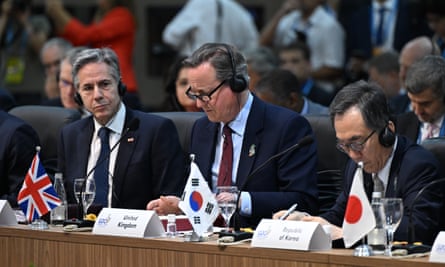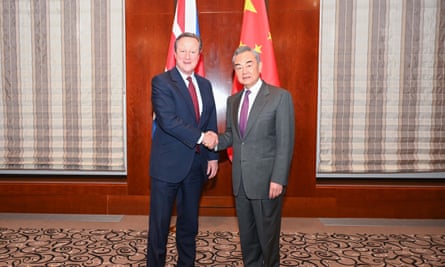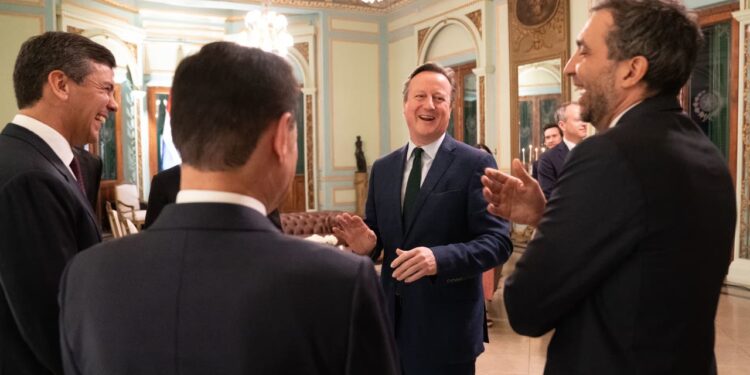The Foreign Office view is the ex-PM’s return has been a shot in the arm for UK diplomacy, despite an awkward juggling act over China
With the Conservative party lagging 20 points behind in the polls, enduring crushing byelection defeats and weekly controversies, it’s a difficult time to be a government minister.
One figure who appears to glide effortlessly above the mire though is David Cameron, who was unexpectedly brought back to the political frontline in November as foreign secretary. He marked 100 days in office last week and has by all accounts loved every minute of it.
The Foreign Office appears to love him back. Despite his considerable political baggage, the prevailing view in the department is that having Cameron at the helm has been a shot in the arm for UK diplomacy, insiders said.
Officials are seemingly impressed with his energy and work ethic. Diplomats say he is a natural mediator who knows how to interact with foreign dignitaries and inject humour at the right moments.

Cameron, a member of the House of Lords rather than an MP, has no constituency to worry about, nor does he have to hurry back from abroad for tricky Commons votes. Plus, being a former prime minister lends him stature and opens doors, his supporters say. “He’s getting a lot done,” one European diplomat in London concluded.
Unusually, Cameron seems to have been given licence to set British foreign policy while the prime minister, Rishi Sunak, focuses on domestic issues ahead of the general election. One civil servant who has worked with Cameron said he was like the “foreign affairs PM”.
Nowhere has this been more apparent than over the conflict in the Middle East. Cameron made headlines last month by declaring that the UK was prepared to recognise a Palestinian state before a two-state solution had been negotiated with Israel.

Downing Street has repeatedly denied any suggestion of a split with Sunak on the issue. “Frankly, I don’t think Rishi Sunak is very interested in foreign affairs and I think he’s happy to leave that to Cameron,” said Peter Ricketts, who served as national security adviser and ambassador to Paris during his premiership.
“Cameron always found foreign affairs fascinating as prime minister, and now he can do it full time. With the authority that comes with … he can speak out and he can push the envelope on British policy, as he did over the issue of recognising a Palestinian state.”
Some believe Cameron is acting as an outrider for the US on the issue, helping to put pressure on Israel to start discussing a viable long-term solution. “If you’re going to have a two-state solution, you’ve got to recognise a Palestinian state at some point,” Ricketts said. “I suspect it’s quite helpful to [the US secretary of state] Antony Blinken and he probably doesn’t feel he can go that far himself, but he’s quite happy that Cameron should be staking that position out.”
Gaza aside, Cameron’s main focus has been Russia’s invasion of Ukraine. He travelled to Washington DC in mid-February and delivered a punchy message about the need to continue funding Ukraine’s defence.
Some, however, thought that for its intended audience of rightwing Republican legislators, some of them supportive of Donald Trump, the message was off the mark. “Many Republican sceptics support the Ukraine cause but see China as the ultimate threat, and worry the US can’t fund both Ukraine and Taiwan,” a source who has had discussions with the Republican right this month said.
“Cameron came over with a heavy-handed lecture telling these people that they are a bunch of appeasers when he himself has a load of baggage around China. That was always going to go down badly.”

China is an area where Cameron has had to tread carefully. The landscape has changed dramatically since he was prime minister. He heralded a “golden era” of relations in 2015, welcomed Xi Jinping on a state visit and, after leaving office, he tried to set up a £1bn UK-China investment fund. As recently as September, Cameron flew to the UAE to drum up investment for the controversial Chinese-built Port City Colombo in Sri Lanka.
Cameron tackled the issue in his first interview as foreign secretary by stressing the government line. “China has become much more aggressive,” he told the BBC. “And so that’s why security and protection is such an important part of our policy. Engaging China is one part of the approach we need to take … We’re not going to solve challenges like climate change, unless we engage.”
Senior officials say he has handled the issue delicately so far. “The worry was that he was going to go totally the other way to prove how anti-China he was. He didn’t do that,” one said.
“He’s performing a careful balancing act between pressure from China-sceptic politicians and what the UK’s international partners are doing,” said Sam Hogg, a foreign policy analyst who writes the Beijing to Britain intelligence briefing. “The US, many EU countries and Australia have sent senior representatives to China, including heads of government. The UK is lagging behind in this respect.”
Coming up on Cameron’s agenda is a trip to the Indo-Pacific next month, though China is not currently on his itinerary. He had been in talks about making a trip to India in February, which failed to materialise because of scheduling issues. His team said it was now unlikely he would be able to visit India before its general election, which is scheduled to take place in April or May.
Cameron’s reception and approach to the Indo-Pacific — a priority region according to the government’s foreign policy strategy — will be the next test. During his first three months he has travelled to Ukraine, Israel, the West Bank, several European capitals, the Falkland Islands, Paraguay, Brazil for G20 meetings and New York for the UN, returning to London over the weekend.
“Britain is back,” he triumphantly told a glitzy Foreign Office reception at Lancaster House just before Christmas.
In a sign that not everyone thinks the world of Cameron, however, one senior government official present said they had found his address a little jarring. “You may be back,” they remarked. “We’ve been here all along.”
Source: The Guardian




Recent Comments